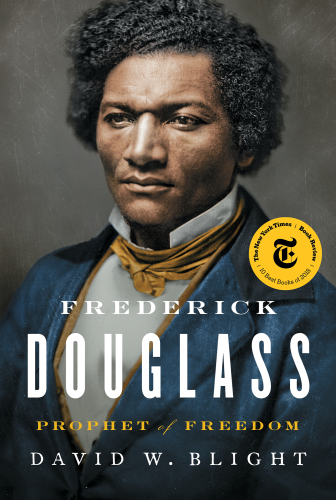
Frederick Douglass
Prophet of Freedom
کتاب های مرتبط
- اطلاعات
- نقد و بررسی
- دیدگاه کاربران
نقد و بررسی

June 1, 2018
Winner of the Bancroft Prize, the Abraham Lincoln Prize, and the Frederick Douglass Prize, among others, Yale historian Blight has been studying Frederick Douglass for most of his life. With a seven-city tour.
Copyright 2018 Library Journal, LLC Used with permission.

August 1, 2018
A lengthy but easily digestible biography of the famed ex-slave, abolitionist, and autobiographer.In this superbly written book, Civil War and Frederick Douglass (c. 1818-1895) scholar Blight (American History/Yale Univ.; American Oracle: The Civil War in the Civil Rights Era, 2011, etc.), a winner of the Bancroft, Abraham Lincoln, and Anisfield-Wolf prizes, ably captures his complex subject from all angles. While many readers may be familiar with Douglass' escape from slavery, self-education, and early life (thanks to his autobiographies), most nonscholars are not as well-versed in the details of his later life--e.g., his role in the Civil War, political campaigning, fight for suffrage, complicated family relationships, and more. It's in these later years that Blight's work really shines; in fact, Douglass' early slave life and escape only cover roughly the first 100 pages of the 760-page narrative (followed by 100 pages of notes). From there, Blight makes the case for Douglass as an American prophet in the mold of the Old Testament's Jeremiah or Isaiah. Though he often scolded and admonished in his speeches and writings, often in King James-style vernacular, he also never gave up hope of a coming time of freedom for his black brethren. Douglass truly was the "prophet of freedom" all the way until his death in 1895, fighting for civil rights until the very end. While some readers may want more coverage of his early life, and perhaps more analysis of what Douglass means today, Blight viscerally captures the vitality, strength, and determination of his subject. For such a renowned figure, who was perhaps the most photographed and recognizable person of the 19th century, there is surprisingly little in the way of modern, full-scale, accessible biographies. Blight delivers what is sure to be considered the standard-bearer for years to come.A masterful, comprehensive biography, particularly of Douglass' Civil War, Reconstruction, and Gilded Age years and occupations.
COPYRIGHT(2018) Kirkus Reviews, ALL RIGHTS RESERVED.

Starred review from August 27, 2018
Yale historian Blight’s study of runaway slave-turned-abolitionist Frederick Douglass—a “radical patriot” and “prophet of freedom,” a “great voice of America’s terrible transformation from slavery to freedom”—benefits not only from Blight’s decadeslong immersion in the history of American slavery and abolitionism, but also from his access to privately owned sources unavailable to previous scholars. To Blight, Douglass’s character and ideology were rife with paradox, and in this huge and meticulously detailed study he unpacks apparent contradictions: Douglass’s unexpected happiness as an urban slave in Baltimore; his devotion to his wife, Anna, and their children, whom he rarely saw due to his constant travels as an abolitionist orator; his love for the promise he saw in America and hatred of how slavery had degraded it; his repeated revisions of his autobiographical writings as he reinterpreted his experiences; his second marriage to a white woman, an act both socially transgressive and opposed by his children. The Douglass who emerges from this massive work is not always heroic, or even likable, but Blight illuminates his personal struggles and achievements to emphasize what an extraordinary person he was. Though one might wonder, given Douglass’s extensive writings and the numerous works of scholarship discussing him, about the need for yet another biography, it turns out that there was much more to be learned about him.

























دیدگاه کاربران